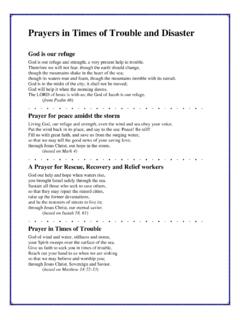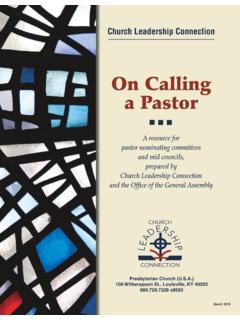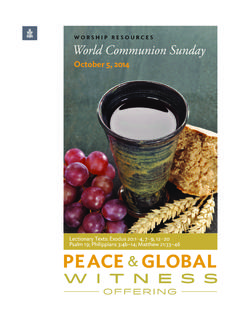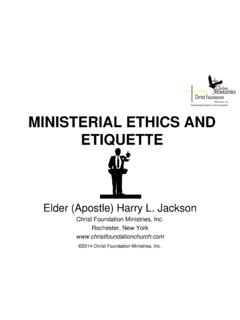Transcription of PC(USA) Structure and Governing Bodies
1 PC(USA) Structure and Governing Bodies The Governing Bodies of the Presbyterian Church ( ) are: sessions, presbyteries, synods and the General Assembly. They are described below. All references in parentheses are to paragraphs in the Book of Order, the Constitution of the church. ( ). Session The session governs a particular congregation. It is made up of elders elected by the congregation, plus all the installed pastors on the staff, including pastors, co-pastors, and associate pastors. ( ). The session is responsible for all decisions regarding the program and policies of its congregation, except for the two powers reserved for the congregation: the election of officers, including the pastoral staff, and the buying, selling, and/or mortgaging of church property.
2 The constitution spells out 19 specific duties for the session. ( , ). The session is composed of elders elected for specific terms of service as well as the installed pastor(s) and associate pastor(s). It is presided over by the moderator, who is the pastor or a minister member of the Presbytery when the pastor is not available. ( , , ). The session elects its own clerk, who is called "Clerk of the Session." The clerk of the session must be an elder, but not necessarily one serving currently on the session. The session elects the clerk for such term as it shall determine. The clerk of the session has many duties regarding the records of the church, and also serves as secretary of meetings of the congregation. ( , ). PCUSA ~ How It Works 2008. Presbytery The presbytery is the Governing body that has jurisdiction over the sessions of all Presbyterian Church ( ) congregations within its bounds and all its minister members.
3 It is composed of "all the churches and ministers of the Word and Sacrament within a certain district". ( ). When the presbytery meets, its members include: - all ministers of the Word and Sacrament who are members of the presbytery, - all elders commissioned by their sessions to attend that meeting - any elder elected moderator of the presbytery for the duration of his or her term. ( ). The Constitution spells out 26 specific responsibilities of the presbytery that fall into three general categories: those relating to congregations, those relating to ministers of the Word and Sacrament, and those relating to synod and the General Assembly. ( ). Responsibilities to Congregations The presbytery has the power to organize new congregations, to merge or to divide congregations, to dismiss a congregation to another denomination or dissolve a congregation, all this being done in consultation with the members of the congregation involved.
4 ( ). When a church is without a pastor, the presbytery takes special oversight of that church, appointing a moderator for the session, providing for the pulpit to be supplied, and doing other things necessary in the absence of an installed pastor. The presbytery PCUSA ~ How It Works 2008. also hears and acts on requests from congregations for waivers relating to electing both women and men as officers and relating to the rotation of officers. ( ). Responsibilities to Ministers of the Word and Sacrament The presbytery has the power to "ordain, receive, dismiss, install, remove, and discipline ministers." It is the prerogative of the presbytery both to establish the relationship between a congregation and a minister and to dissolve a relationship when necessary.
5 Establishing a relationship ordinarily means approving the call of the congregation to that particular minister to be its pastor and installing the pastor in that church. Before the presbytery approves the call to a particular minister, it hears the recommendations of the committee on ministry about its study and conclusions regarding the call. ( , , ). For persons to become ministers of the Presbyterian Church ( ), they must first complete a period of candidacy, which includes supervision of the candidates'. education and practice of ministry for a period of two years. The committee on preparation for ministry oversees this whole area of the Presbytery's responsibility. ( ). Not all ministers are pastors of churches. The presbytery has responsibility for oversight of those ministers who work in other areas of ministry, such as teachers, evangelists, administrators, and in other forms of ministry recognized as appropriate by the presbytery.
6 ( ). Responsibilities to Synod and General Assembly The presbytery participates in the deliberations of synod and of the General Assembly by electing commissioners to serve as members of these Governing Bodies at their meetings. It also hears and receives reports from the commissioners when they return from the meetings. Further, the Book of Order specifies that the presbytery is responsible for insuring that the orders of these Governing Bodies are carried out within the presbytery. ( ). The presbytery has the right and the responsibility to propose to the synod or the General Assembly "such measures as may be of common concern to the mission of the whole church." This is generally accomplished through an "overture," which is a written concern adopted by the presbytery and sent to the synod or General Assembly for consideration.
7 ( ). PCUSA ~ How It Works 2008. Synod The synod is the Governing body that has oversight of the life and mission of the Presbyterian Church ( ) within a specific geographic region that includes at least three presbyteries. It must meet at least once every two years. It can establish a council to take care of things that arise between meetings. ( , ). Synods are regional in nature, enabling the presbyteries within their region to discover, design, and implement ministries that are common to the area. Depending on a number of things, including population and the number of churches in the region, a synod's boundaries may be one or more states. Each synod must be composed of at least three presbyteries. When the synod meets, its members include an equal number of ministers and elders elected by its presbyteries.
8 ( ). The Constitution spells out 20 specific responsibilities of the synod that fall into two general categories: those relating to its member presbyteries and those relating to the General Assembly. ( ). Responsibilities to the Presbyteries The synod has the power to "organize new presbyteries and to divide, unite, or otherwise combine presbyteries or portions of presbyteries previously existing." This includes the opportunity to organize non-geographic presbyteries to serve the needs of racial ethnic or immigrant congregations. ( ). The synod has the responsibility "to provide services and programs for presbyteries, sessions, congregations, and members within its area that can be performed more effectively from a broad regional base." It is the synod's right and duty to provide PCUSA ~ How It Works 2008.
9 Programs that will help its presbyteries do ministries together that would be difficult or impossible to do alone. ( ). Synods are also charged to "develop and provide resources as needed to facilitate the mission of its " Synods will often offer programs that facilitate leadership training, campus ministry, or other kinds of ministry that transcend the bounds of their presbyteries. ( ). Responsibilities to the General Assembly The synod has limited responsibilities with regard to the General Assembly. They do not elect commissioners to the General Assembly, for instance. However, synods are charged with seeing that the orders of the General Assembly are communicated and carried out within the synod. Synods, like presbyteries, are responsible for proposing to the General Assembly "such measures that may be of common concern to the mission of the whole church.
10 " This responsibility enables the synod to be a communication link between the presbyteries and the General Assembly. Not only does synod facilitate the General Assembly's understanding of the concerns of the presbyteries, but it also assures the presbyteries of what the General Assembly has decided. ( ). PCUSA ~ How It Works 2008. General Assembly The General Assembly is the most inclusive Governing body in the Presbyterian Church ( ). It is made up of equal numbers of ministers and elders elected by the presbyteries, and it also has a number of Advisory Delegates--such as Youth Advisory Delegates, Theological Seminary Advisory Delegates, Ecumenical Advisory Delegates, and Missionary Advisory Delegates-who have voice but not vote on the floor of the Assembly.









